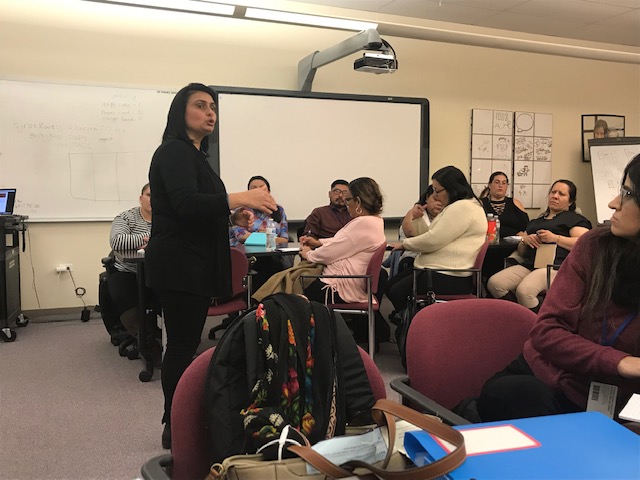The Professional Interpreter in Community Services Settings


In collaboration with Cesco Linguistic Services , the Denver Office of Immigrant & Refugee Affairs (DOIRA) is launching The Professional Interpreter in Community Services Settings program. This 80-hour program is for interpreters looking to gain professional training in interpreting and aims at increasing the number of qualified interpreters. If you are fluent in Amharic, Arabic, Armenian, Burmese, Cantonese, Farsi, French (Central and Eastern Africa), Haitian, Karen, Khmer, Korean, Mandarin, Nepali, Russian, Somali, Swahili, Urdu, or Vietnamese, this is the right program for you receive extensive training, learn, expand, and improve your interpreting skills and support the providers’ efforts to facilitate language access in Denver and beyond.
The Professional Interpreter in Community Services Setting is a national certificate program for community interpreting in the U.S.
Participants will be trained to interpret in community settings, covering interpreting protocol and skills in education, medical and social services.
Applications can be sent by clicking on the APPLY button. Applicants will take a language proficiency assessment in English and in their other language to qualify for the training.
Dates
Applications by: March 30, 2023
Language Assessment: March 29, 31
Training Schedule:
When: April 2023
April 3 (Mon), 4 (Tue), 5 (Wed), 6 (Thu), 10 (Mon), 11 (Tue), 12 (Wed), 13 (Thu), 18 (Tue), 19 (Wed), 20 (Thu), 21 (Fri)
Time: 9:00am to 4pm
Testing & Training Location:
- Testing Location: 1355 S. Colorado Boulevard, Denver CO 80222
Parking is available for the duration of the training.
This is an extensive interpreting program based on The Community Interpreterwhich is the first and only national certificate program for community interpreting in the U.S. This 80 hour program will empower participants preparing for the interpreting profession, to honor the communicative autonomy of each party; promote critical thinking and decision making process strategies to respond to any communication barriers; propose the Strategic Mediation Model and the Roadmap to Advocacy as effective ways to support impartial delivery of services; and cover the importance of a professional identity and the pursuit of professional best business practices to raise the bar of the profession.
Participants will be able to develop problem-solving skills and use decision-making tools that they can apply almost anywhere through extensive use of role plays, activities and group exercises, as well as discussions based on video.
This course covers ethics and conduct, basic skills (from pre-session to post-session), positioning, terminology, modes of interpreting, steps for sight translation, intervention strategies, cultural mediation, and other vital skills and protocols. It breaks professional skills into simple components and offers simple decision-making tools to help interpreters make on-the-spot judgment calls in daily practice. It tackles many of the most persistent challenges in the field and proposes practical, easy-to-implement strategies based on the highest professional standards. It also guides interpreters on how to develop problem-solving skills and use decision-making tools that they can apply almost anywhere through extensive use of role plays, activities and group exercises, as well as discussions based on video. It covers the delivery of services in person (onsite), via phone and via video.
The program concludes with a two-hour written assessment on the last day of training. It offers three levels of certificates for successful candidates:
- Level 1: Qualified Interpreter
- Level 2: Professionally Trained Interpreter
- Level 3: Hospitality Interpreter
Eligibility Criteria:
- Applicants must speak Amharic, Arabic, Armenian, Burmese, Cantonese, Farsi, French (Central and Eastern Africa), Haitian, Karen, Khmer, Korean, Mandarin, Nepali, Russian, Somali, Swahili, Urdu, or Vietnamese and wish to enter the interpreting profession.
- Proof of Language Proficiency: All participants will be tested for language proficiency assessments in English and the other language they self-identify (Amharic, Arabic, Armenian, Burmese, Cantonese, Farsi, French (Central and Eastern Africa), Haitian, Karen, Khmer, Korean, Mandarin, Nepali, Russian, Somali, Swahili, Urdu, or Vietnamese) before starting the program.
To learn about the training curriculum, see below.
- Intro to US Systems – This section will cover an introduction to the educational, medical, social services and legal systems.
- Interpreting Protocols and Strategies – The program covers interpreter’s ethics and conduct, basic skills (from pre-session to post-session), positioning, terminology, modes of interpreting, intervention strategies, cultural mediation, and other vital skills and protocols. It offers simple decision-making tools to help interpreters make on-the-spot judgment calls in daily practice and guides interpreters on how to develop problem-solving skills through extensive use of role plays, activities, group exercises, as well as discussions based on videos.
- Interpreting Skill Building – This section will focus on skill building strategies and techniques to build and enhance the delivery of interpreting services in consecutive mode, note-taking and sight translation. It will also provide an introduction to simultaneous mode of interpreting.
- Professional Identity & Business Practices – This section will cover the basic tools to use to complete all the necessary administrative tasks revolving around an independent contracting (freelance) profession.
- Final Test









 BY DOUBLEWITHDIGITAL
BY DOUBLEWITHDIGITAL